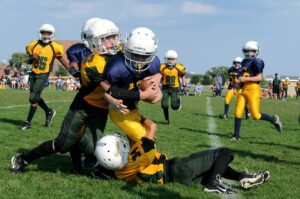It can be unnerving to watch your child play certain sports when you know about the risks for traumatic brain injuries (TBIs). TBIs are defined as brain dysfunction caused by an outside force, such as a blow to the head. Examples include the impact from another athlete running into your child, a ball hitting your child’s head, or the impact of a bad fall.
Research shows that one-fifth of TBIs in youth result from sports activities. Over the last decade, we’ve started hearing more about the lingering effects of TBIs from sports injuries.

(Ben Hershey/unsplash)
Postconcussive Syndrome (PCS)
One common condition is postconcussive syndrome. This starts with a brain injury caused by a blow to the head or a violent shaking of the head and body (a concussion).
Concussions are usually classified as “mild” brain injuries because they aren’t life-threatening, and they resolve in less than a month. But others linger, which is where persistent postconcussive syndrome comes in. These TBIs can have lasting effects on cognition, learning, memory, and executive function.
Good students may soon become struggling students. They may have trouble understanding concepts, paying attention, retaining information, or organizing themselves to turn assignments in on time. They may also experience:
- Fatigue
- Disordered sleep
- Headache
- Vertigo
- Irritability
- Anxiety
- Depression
- Apathy
- Personality changes
PCS often begins shortly after head trauma (though it could start days later). In many cases, it can resolve with time and/or therapies, but the toll it can take in the meantime can be significant (lost work, missed school, poor academic performance, isolation, relationship difficulties, etc.)
Chronic Traumatic Encephalopathy (CTE)
CTE is another TBI-related condition. It results from multiple blows to the head and concussions and is common among boxers and football players. It shares many of the symptoms of postconcussive syndrome, but it is classified as a degenerative brain disease. Unlike postconcussive syndrome, it won’t likely show up immediately. Rather, it will develop slowly over years of repeated head trauma.
In early life (the late 20s and early 30s), it is common for CTE to manifest through mental health and behavioral issues. This may include depression, suicidal thoughts, anxiety, impulsive behavior, and aggression. Later in life (around age 60), it is more likely to manifest through thinking and memory problems (and ultimately dementia).
We’ve come a long way in requiring students to wear certified headgear and schools to implement concussion protocols, but concussions still happen. When they do, parents often assume they have no right to sue because they’ve signed the school’s concussion waiver. However, the waiver is only binding under circumstances.
When to Call a Las Vegas TBI Attorney
Just because a Nevada school (or sports organization) has a TBI/concussion policy doesn’t mean that the school is implementing it in all the right ways. Here are some instances where we have seen negligence on the part of schools/organizations resulting in families pressing and winning lawsuits.
- Not having or adhering to concussion protocols. Schools may have “loosey-goosey” concussion guidelines, but if there is no clear, documented protocol, they could be held liable for a child’s TBI. Or if they have a protocol but are not adhering to their designated responsibilities, they could be considered negligent.
- Pressuring players to risk their health. If a coach is aware of a player’s concussion-related risks and encourages them to participate anyway, the school could be liable. This may apply to a coach putting an athlete back in the game before they have fully recovered.
- Leaving the decision to a minor. A coach may want to avoid the above scenario of blatantly telling a player to get back in the game. Instead, they may leave it up to the player. This may be considered too much responsibility to put on a minor, especially if they have not been given the property counsel to make this decision.
- Mishandling post-TBI care. A school should have clear protocols for responding to an injury. This could involve calling an ambulance immediately if the athlete exhibits certain symptoms. If these protocols are breached, the school could be found negligent.
- Failing to fix dangerous conditions. A slippery floor in the weight room. A big rock on the soccer field. These are examples of dangerous conditions that could lead to a lawsuit if the school doesn’t properly resolve them.
- Subjecting an athlete to excessive training. If a coach insists on extreme training regimens that endanger athletes and lead to injuries, the school could be held liable.
- Failing to heed warning signs. In most concussion waivers, athletes commit to report their symptoms. If the young athlete can’t (or doesn’t) report but shows obvious symptoms that the coach fails to act on, there may be a case for negligence.
What if the Doctor is at Fault?
If your doctor fails to properly diagnose your TBI and/or clears you to play too quickly, they may be considered at fault as part of a medical malpractice lawsuit.
If you believe that your child’s school, sports organization, or doctor was at fault in their TBI case, contact our TBI attorneys in the greater Las Vegas area. We know the laws surrounding sports-related TBIs in Nevada. We can help you know if you have a viable case on your hands and ensure that you get the medical care and financial compensation that you are legally entitled to.
